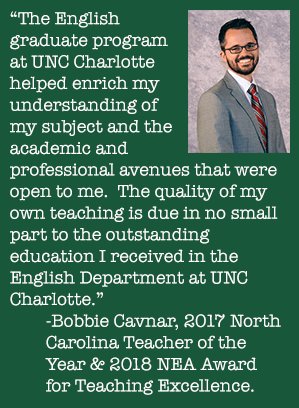M.A. in English: Literature
The Masters in Literature combines a broad grounding in the elements of literary study with the chance to pursue in-depth research in an area of interest through an optional thesis. Students in our program engage with diverse theoretical perspectives and cultural contexts, broaden their knowledge of literary history, and develop their skills in close reading, interpretation, and critical writing. Our annual graduate student conference offers students a chance to present their insights about literature in the form of conference papers, before an interested audience.

The graduate faculty in literature are active scholars who publish widely in their fields; their publications include articles in scholarly journals, edited collections, edited editions, and numerous monographs. They are committed to researching and teaching a variety of national, global, and ethnic literatures in English, including British, American, and Anglophone literatures; they have developed expertise in literary history, diversity and gender studies, cultural studies, and a range of other theoretical perspectives.
Our graduates’ strong writing skills have proved to be assets in fields such as business, journalism, law, and publishing. Some students completing the Masters concentration in Literature go on to pursue Ph.D Studies in English at other institutions, while many others teach in secondary schools, both public and private, and community colleges.
Consult our website for information on admissions, advising, and capstone experiences.
Requirements for Students Pursuing the Concentration in Literature
The Literature Concentration requires a total of 36 hours (12 courses), which includes at least 15 credits in literature:
- ENGL 6101 Introduction to English Studies
- ENGL 6160 Introduction to the English Language
- 3 hours of literary theory-intensive coursework
- 3 hours of writing or rhetoric courses
- 15 hours in literature, including some historically-oriented coursework, coursework in a range of national and global literatures, and at least one pre-1800 course
- 9 hours of electives (which may or may not include a thesis)
- A portfolio
The Literature Faculty:
- Rob Conkie
(Ph.D., University of Southampton) – Shakespeare in performance, Comics and Graphic Novels, Adaptation Studies, Practice as Research, Creative-Critical Writing - Helen Davies
(Ph.D. University of Rochester) – Medieval literature, History of Cartography, Digital Humanities, History of the Book, Material Culture - Paula Eckard
(Ph.D., University of South Carolina) – American Literature and Culture, Southern Literature and Culture, Maternal Studies - Elizabeth Gargano
(Ph.D., University of Virginia) – Victorian Literature, Children’s Literature, The Novel, Women’s Literature and Feminist Theory - Katie Hogan
(Ph.D., Rutgers University) – American literature, LGBTQ+ Literature and Culture, Gender and Sexuality Studies, Ecocriticism, Literature of Environmental Justice, Girl Cultures - Jeffrey Leak
(Ph.D., Emory University) – Twentieth-Century African-American Novel, Gender and Cultural Studies, Biography - Janaka Lewis
(Ph.D., Northwestern University) – Early 19th C. African-American Literature, African American Women’s Writing - Kirk Melnikoff
(Ph.D., Boston University) – Elizabethan Literature, History of the Book, Performance History, Shakespeare on Film, Renaissance Publishing - Juan Meneses
(Ph.D., Purdue University) – 20th and 21st century British and postcolonial literature, Theory, World Literatures, Ecocriticism - Alan Rauch
(Ph.D., Rutgers University) – Victorian & Romantic Literature, Science Studies, Material Culture, History of the Book, New Media - Matthew Rowney
(Ph.D., CUNY) – British Romanticism, Ecology, Literature and the Environment, Literature and Science - Daniel Shealy
(Ph.D., University of South Carolina) – American Literature, Children’s Literature - Maya Socolovsky
(Ph.D., Oxford University) – US Latino/a Literature, Multicultural American Literature, Jewish American Literature, Literary Theory, Latin American Studies - Lara Vetter
(Ph.D., University of Maryland at College Park) – Modern and Contemporary Literature, American Literature and Culture, Poetry, Life Writing, Gender and Sexuality Studies